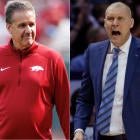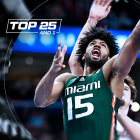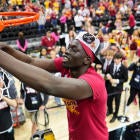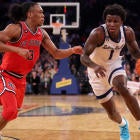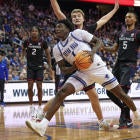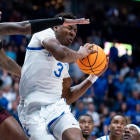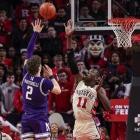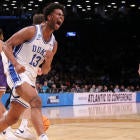DURHAM, N.C. -- I had just watched the potential No. 1 overall pick in the 2018 NBA Draft, Duke's versatile and explosive freshman forward Marvin Bagley III, get after it in practice for two hours straight. He didn't even let up in post-practice sprinting; he beat his teammates in all their court-length sprints. I'd watched him, flat-footed, jump up from directly under the hoop and throw down a lob. I'd watched him grab a rebound off the defensive glass, both of his elbows above the rim, then run the break and lay it in, Giannis-like. I'd watched him spot up pretty lefty 15-footers with a range that extends to the 3-point line.
And as he did all this remarkable stuff for his remarkably talented, No. 1-ranked college basketball team, the 18-year-old phenom knew that he represented the conundrum of college hoops in 2017. Bagley knew that in an alternate universe, one in which the universally hated (and patently unfair) one-and-done rule didn't exist, he wouldn't even be here.
Yet here he was. And enjoying every second of it.
"I think if you're good at something and you're able to take your talent to the next level, you should be able to do that," Bagley told me after Duke wrapped up practice. "I don't know what everybody else thinks about it or what the NBA is thinking about it. But in my opinion if you're really good at something, if you can help your family out and make a living off it, you should be able to do that just like any other sport that can do that."
An extended version of my interview with Bagley can be found in CBS Sports' Flagrant 2 podcast, where we talked about his influences on and off the court and more.
Follow @SportsReiter and @ReidForgrave on Twitter!
Subscribe: via iTunes / Stitcher / TuneIn
But a big part of the conversation centered on where Bagley is now. And despite knowing that in a more just sporting world he would never have set foot on Duke's campus, Bagley told me that his one year playing for Mike Krzyzewski was the absolute best move he could have made for his basketball development.
"It's amazing," Bagley said. "It's the best decision I've made in my whole life, to come here and to play for Coach K and the coaching staff here at Duke. Every day I'm learning something new that I didn't know before. Coach K has been really honest with me in film, telling me when I'm messing up, telling me when I'm doing something good. Just teaching every single day about different defensive stuff, offensive stuff. I'm having fun, man."
The NBA's age limit is one of the most divisive rules in sports. College coaches, even the ones who take advantage of the rule, don't like it because it turns college hoops into a minor league for the NBA, and it forces them to re-recruit every year. Young basketball players don't like it because it limits their options; a talented basketball player who doesn't love school is basically forced to attend college because, let's be honest, playing overseas or spending a year in the NBA's developmental league are far worse (and far more difficult) options. Free-market economists don't like it because it's a socialistic tweak to our capitalistic economy.
Pretty much the only people on earth who like it are the owners and front-office executives of NBA teams, who get a risk-free one-year look at top prospects to see if they're worth investing millions of dollars in with a draft pick.
And yet, here's the thing: Despite being patently unfair to force these young men to play as amateurs for a year, the one year in college often becomes a good thing for their maturity and their development. Kentucky coach John Calipari has described the one-and-done season as a "gap year" for these uber-talented young men. Instead of going straight from having their mom rouse them from bed every morning to being a millionaire professional athlete striking out on his own, the one-and-done player can be eased into becoming a professional in a more nurturing, forgiving environment.
As a philosophical question, the one-and-done rule is bunk. In practice, though, these players can benefit greatly. Despite these seeming to be two conflicting ideas, it is possible for both of these thoughts to coexist in Bagley's mind – and in our minds as college basketball fans, too. Just because the one-and-done rule is crap doesn't mean certain young men can't benefit from it. The fact that these players are all but forced into this choice is what the real issue is here.
Look at Bagley. He likely would've been the No. 1 overall pick in the 2017 NBA Draft, if he'd been eligible. And yet he still has so much to learn. You watch him in practice, and you can see the awe-inspiring potential despite still struggling with the subtleties of defense. You see a player who will be a world better in March than he is in November. You see a willing learner who is eager to soak in the knowledge of the greatest college coach of all time and his staff.
"He's been gifted with size, elite athleticism, a tremendous work ethic, and he really loves to learn," Duke associate head coach Jeff Capel told me. "The thing that's been most impressive to me, and this is from the first time I saw him, I have never seen – whether it's a workout, a practice, whatever – I've never seen him not play hard. And that is very rare for any player, but especially for an elite player. Every time I've seen him he has played his ass off. That's a gift. And that's something that's very rare, especially now."
One of the early knocks on Bagley was that the fact he played on so many different youth teams and high school teams indicated some sort of red flag, as if it was a byproduct of the no-loyalty AAU culture. Not so, Bagley told me. Bagley remembers when he was first ranked as the No. 1 recruit in the country – way back in middle school. It was heady stuff, and also the type of stuff that can ruin an aspiring NBA player by inflating his ego and hindering his development.
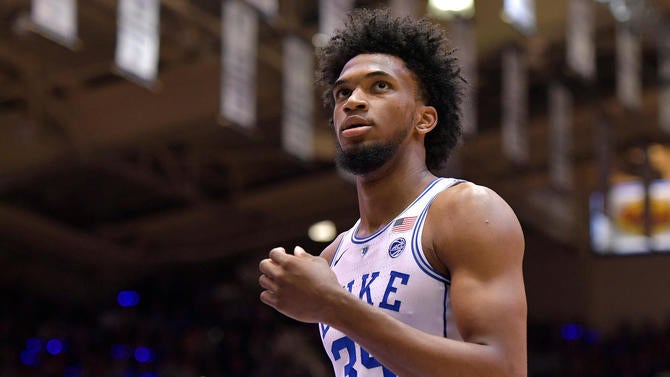
Even in middle school, the leeches of youth basketball tried to attach themselves to this up-and-coming prospect. "People just coming out of nowhere, people I hadn't talked to in years," Bagley said. His father put a wall up around the family to protect his son. When a coach hindered Bagley's development by, say, trying to turn him into a pure post player, his father put Bagley on another team or into another school.
"I didn't understand it when he was doing it back at the time," Bagley told me. "But now that I'm getting older, I'm learning a lot, and I'm very thankful he put me away from all the craziness. I can see it, and I understand why."
In a basketball sense, that has meant Bagley hasn't been put into the box so many near-7-footers are put into, the box of making him play like a traditional big because he's bigger and stronger than everyone else. Instead, he's progressing in the mold of the new age big man, a versatile player that's hard to label. Dirk Nowitzki revolutionized the power forward position. Then Kevin Durant became an unstoppable giant wing player. Today, Giannis Antetokounmpo is a near-7-footer like nothing the league has seen, a point guard who dominates the paint, a shot-blocker who guards the perimeter. That's the goal for Bagley, someone who can break out of the historic box that seven-footers have been put into.
"We saw a little bit of that immediately, that he does everything on the court," said Andre Chevalier, who coached Bagley in high school at Sierra Canyon School in Los Angeles as well as in summer ball. "His game evolved, and he started to explore putting the ball on the floor, shooting a three. One of the things about Marvin, when he decides he wants to do something, he works on that continuously until he's good at it. He sees a move on TV, and the next day in practice you see him doing that 60 times to perfect it and put it in his game."
That's what you'll see in Marvin Bagley in what will almost certainly be his only season at Duke: Not anywhere near a finished product but instead a series of glimpses and foreshadowings of the unique and transcendent player he may someday become.
You'll also see a thoughtful, gentle and polite young man off the court. He's someone who listens to poetic and powerful rap music (current favorites: J. Cole, Drake, Logic; his pick for G.O.A.T.: 2Pac), but he also makes his own poetic and powerful rap music. Go listen to the track he released last week. It's really, really good.
He's someone who has been told since he was in middle school that he's going to be a millionaire NBA player, yet he's someone who tried to never pay attention to recruiting rankings. He's someone who wears his Christian faith on his sleeve without being overbearing about it, someone who grew up listening to gospel music and going to church every Sunday. "If it wasn't for Him, I wouldn't be here," Bagley told me. "I still can't believe I'm playing basketball, doing this here at Duke -- it's kind of a dream come true."
And in a roundabout way, that brings us back to the current conundrum of college basketball. Marvin Bagley III knows that in a more just world, he would not be here. He would already be in the NBA. But he also believes that playing for Duke is a dream come true, and that this presumed one-and-done season will be of great benefit to him when he does go to the NBA. It is possible to believe these two seemingly contradictory thoughts, that the NBA's age limit is not a good thing, but good things can still come out of the one-and-done system.
This rule won't be around forever. Adam Silver is already considering changing it. When the next rule is considered, I hope that the views of people like Marvin Bagley III, people who see both sides of it -- the unfairness of the rule, but also the benefits of the rule -- are the most prominent voices in the debate.















